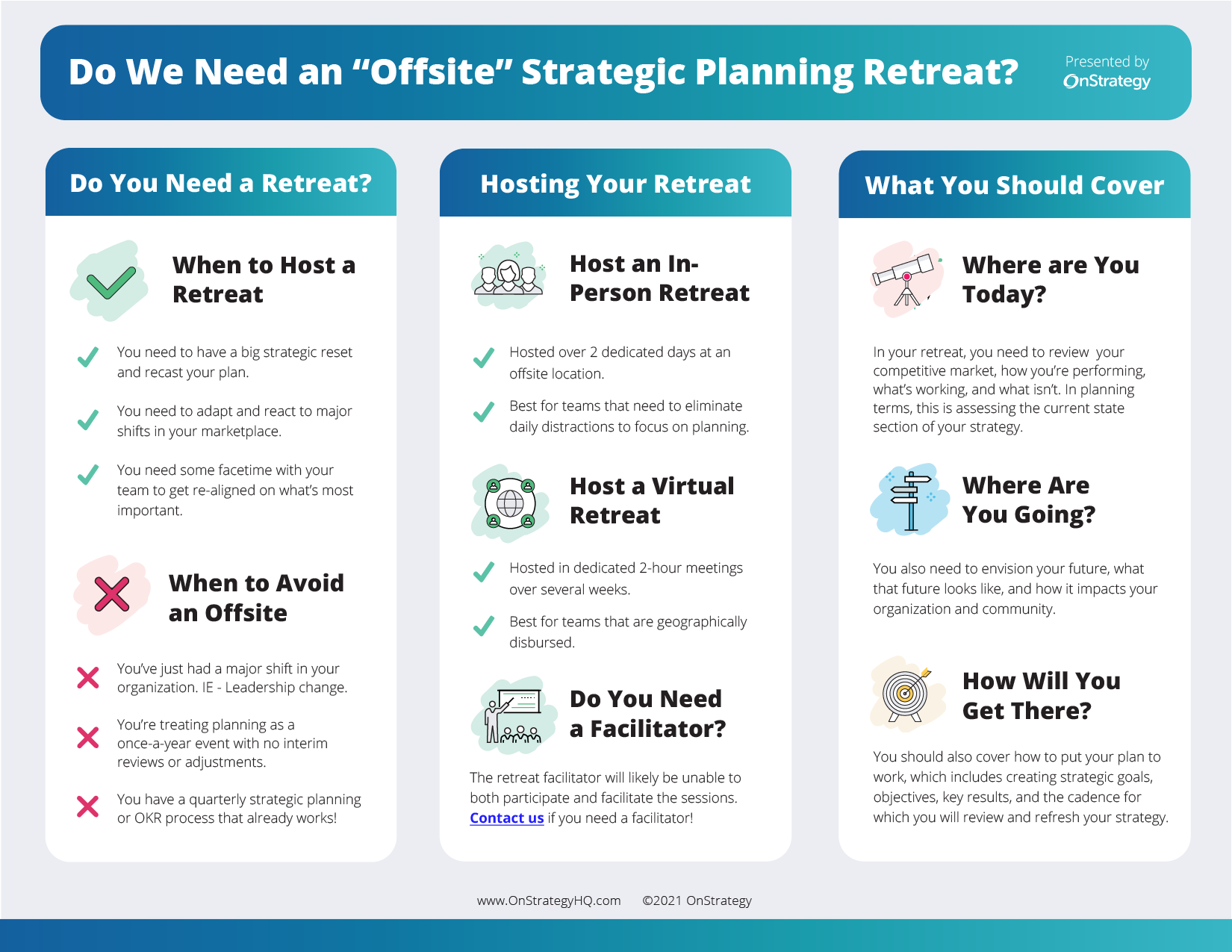As many organizations start to ditch the idea of an annual offsite retreat in favor of more agile quarterly strategy refreshes, you might wonder when you need a more traditional strategic planning offsite retreat. Do you still need to hold one annually?
The short answer is no! If you’ve opted for a more agile approach for reviewing and refreshing your plan quarterly (you can learn more about that here), you really shouldn’t host the traditional annual planning retreat where you completely overhaul your strategic plan only once a year. Making incremental changes over the course of a year and as you need them is an approach we’d recommend instead.
Does Your Strategy Suck? Get this Free Guide to Find Out.
But there is still a time and place for an annual retreat. In this article, we’ll cover use cases when these planning sessions are useful, how you might consider hosting these sessions, and what you should cover.

When Should You Host an Offsite?
Like we mentioned above, there are a few criteria that might compel your organization to host—and when not to host—a strategic planning retreat.
When to Host an Offsite
- You need a big strategic reset. Even if you’re managing and updating your plan quarterly, there may come a time when you need to reset your plan altogether. That’s ok! Use a retreat as the means to reset your strategy.
- You need face time with your team to get re-aligned. Sometimes an offsite planning retreat is a good opportunity to have quality, in-person time with your team to get re-aligned on what will make an impact in your organization.
Tip – Host this retreat before you set your annual budget. Clarity about what you need to achieve with a new strategy may drive you to allocate your budget differently. Conversely, having a set budget for the year may restrain your opportunity and strategy exploration.
When to Avoid an Offsite
- Do not hold a retreat right before or after a significant shift. Major leadership and management changes, ownership changes, and mergers are high-stress events. Don’t add the stress of resetting your organization’s strategy until your organization is more settled and your team can think holistically and strategically about the future.
- You’ve always held an annual retreat. Please don’t host an annual retreat because that’s what you’ve always done! Annual planning is so last decade—we’d recommend a more agile approach to planning with quarterly reviews and refreshes that keep you and your team thinking strategically, all year long.
How to Hold the Retreat? Who Should Go?
The pandemic has changed the way we work. Traditionally, we would recommend a 2-day dedicated offsite retreat with your team. But many great digital collaboration tools are available to make holding virtual retreats as effective as the traditional strategic planning offsite. Here’s a quick breakdown of the two retreat options:
Offsite Retreat
- Hosted over 2 dedicated days.
- Best for teams that need to eliminate the day-to-day distractions to focus on planning.
Virtual Planning Retreat
- Series of 2-hour meetings over several weeks.
- Best for geographically disbursed teams.
- Leverages tools like Zoom and virtual whiteboards (Miro or Mural).
- Allows planning to be done in sessions and a-synchronously (yes, we mean homework and group projects, but those can create better outcomes).
Tip – No matter which retreat format you choose, prep, prep, prep! Do the work before your planning retreat to provide participants all the data and insights they’ll need to make informed decisions during the sessions. This can include financial performance and forecasts, market performance, external market data, objective data regarding your competition, and analysis on your customers.
Who Should Attend?
The short answer is that it really depends on your organization. We don’t advocate that every single person in your organization attends the planning retreat; use your discretion when it comes to attendees. Here are a few common profiles of planning session participants:
- Executive team
- Board members (or a representative few)
- Department directors (especially if exec team doesn’t have all the functional area expertise)
- Owners of special initiatives or programs you might cover during planning
Should We Hire a Strategic Planning Facilitator?
Our guidance on hiring a planning facilitator comes with two recommendations. The first is that whoever is facilitating the sessions cannot also participate in the conversation or contribute to the strategy. If you need to contribute, you probably should hire an outside facilitator.
Our second recommendation is that it’s ok to recognize when facilitating strategy is outside of your team’s skillset! Sometimes it’s nice to lean on an experienced facilitator to navigate challenging conversations or keep your team thinking strategically. You know how to run your business, a professional facilitator knows how to run a strategy session.
What Should You Cover?
At a high level, strategic planning retreats should cover these three questions:
Where Are We Now? (Strategy)
In your retreat, review your competitive market, how you’re performing, what’s working, and what isn’t. In planning terms, this is assessing the current state section of your strategy.
Where Are We Going? (Strategy)
You also need to envision what the future looks like, and how it impacts your organization and community.
How Are We Going to Get There? (Execution)
You should also cover how to put your plan to work, which includes creating strategic goals, objectives, key results, and the cadence in which you will review and refresh your strategy.
Need an Offsite Retreat?
Again, the decision is yours! But as we said before, if you’re just doing an offsite retreat because it’s something you’ve always done, we’d say skip it.
But if it can shift the trajectory of your organization and give your team a strategy they can follow, as well as review and refresh with consistency, go for it!












